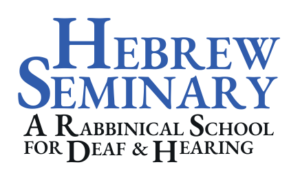Here and Wherever: Commentary on Parashat Vayyikra 5783
By Rabbi Jonah Rank, President and Rosh Yeshivah of Hebrew Seminary
Translated into polite English, an old Yiddish saying roughly goes, “You can’t dance at two weddings with only one body.” Once Zoom became so prominent in the pandemic, we grew accustomed to entering spaces virtually while remaining physically at home. Somehow where we were in body was no longer where our minds were. As Rabbi Dr. Raysh Weiss (full disclosure: my spouse) put it a bit more absurdly in a Yiddish political cartoon, 2020 became the year when “you could dance at two weddings.”

Black and white image of thin female-bodied individual with long dark hair in formal attire, dancing in front of two laptops on a desk, with Yiddish text reading “2020 – אַ יאָר ווען מע האָט געקענט טאַנצן אויף צוויי חתונות” (“2020—a year when you could dance at two weddings”), signed “רWeiss 2021,” accessed at https://forward.com/yiddish/462450/cartoon-zoom-has-enabled-us-to-do-the-impossible/ on March 24, 2023.
The opening words of the Book of Leviticus paint an image of geographic ambiguity. God’s voice emerges from the Tent of Meeting (perhaps synonymous with the Tabernacle the Israelites built in the wilderness), but the text does not disclose Moses’ physical whereabouts. In the 16th century, Rabbi Mosheh Al-Shikh—who left his native home in the Ottoman Empire, relocated to the Land of Israel, and studied among the mystics of Safed—suggested in his own commentary on Leviticus 1:1 that Moses must have been close to the Tabernacle. The voice of God, he suggested, becomes inaudible when the soundwaves try to traverse the Tabernacle. Whether or not such a teaching is true, the Torah never tells us quite how far God’s voice travels. The Kotzker Rebbe, Rabbi Menachem Mendel Morgensztern of Kotzk, Poland taught in the 19th century that God resides “wherever we let God in.” The diversity of our theological tradition allows us to conceptualize a God who rests in one sacred space and appears anywhere where we seek God.
The dual reality of God’s omnipresence and God’s immanence stands among the truths we cherish in the Jewish tradition. The same divine spirit that arranged the cosmos, designed the laws of gravity, and made every organism that has graced this planet is the same God whose warm spirit caresses us in the hour when we need soothing. God is there—out there, somewhere beyond our reach—and God is here—with us, among us, inside us, wherever we are in this very moment.
Not only has our Torah taught us that God crafted us in the divine image (as per Genesis 1:26–27), but the Tabernacle itself concretized the notion that God’s Presence can rest among us (as per Exodus 25:8). In an age when we survive without a Temple yet thrive through the richness of renewing our ritual, spiritual, intellectual, and cultural heritage—we now discover God residing neither in a Tabernacle nor a Temple. Rather, God is in the sacred and ethical decisions, moments, thoughts, and acts that permeate our lives.
On a personal note, I am especially moved by the mystery of not knowing where Moses was when God called for him from the Tent of Meeting. In my own role at Hebrew Seminary, I am excited for what on Sunday next week will be our first in-person ‘Meeting’ for the whole broad Chicagoland Jewish community since the beginning of the pandemic. With all the fond memories we carry from Hebrew Seminary’s founding home at Congregation Bene Shalom, also founded by our beloved Founder and Rosh Yeshivah of 30 years, Rabbi Dr. Douglas Goldhamer of blessed memory—it is a bittersweet but wonderful blessing for us to have a new physical home, a new ‘here’ for our gathering. Our new gathering place, which will soon host many classes and many learners, supplements the everywhere-ness of our online learning. Though we have students in Texas, Virginia, New York, Connecticut, and South Carolina, just to name a few locations—we also have students who live in and near Chicago, who will soon be making regular pilgrimages to the new physical site of Hebrew Seminary. For those among us who live outside Chicago, our new home opens its doors to invite you in whenever you are in town. Hebrew Seminary has many heres and many theres.
Knowing that the scene was not fully set by the Torah, the Eastern European Rabbi Eliyyahu ben Shelomoh Zalman (1720–1797) wondered in his Torah commentary Adderet Eliyyahu whether Moses replied to God when God called for him in the opening of this week’s torah portion, Vayyikra. Echoing other biblical instances of God calling the name of a holy prophet, Rabbi Eliyyahu imagined a God who got Moses’ attention by calling his name twice: “Moses, Moses.” This repetition of the name, says Rabbi Eliyyahu, is both “לשון חיבה” (leshon chibbah, “language of endearment”) and “לשון זירוז” (leshon zeyruz, “language of urgency”). A call to gather must always come with sincerity and love.
No matter where God and Godly actions, places, and times call for us—we are there; we are here.
The weekly Torah commentary of Hebrew Seminary: A Rabbinical School for Deaf & Hearing brings new insights to students of the Torah across the world with no barriers. To help support the culture of learning Torah and teaching Torah at and beyond Hebrew Seminary, please consider making a donation today.

Leave A Comment
You must be logged in to post a comment.